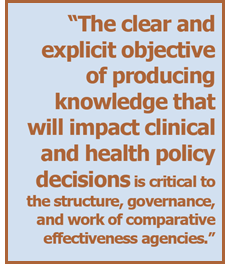An abstract is available at: http://www.milbank.org/quarterly.html
Synopsis
This study examines the key features of government agencies created in Australia, France, Germany, and the United Kingdom to lead research into the comparative effectiveness of medical treatments, procedures, and technologies. In each of the four countries studied, the agencies have a clear mandate to produce information that will inform clinical and health policy decisions. By contrast, comparative effectiveness legislation under consideration in the U.S. Senate explicitly separates the generation of knowledge from health care decision-making.
The Issue
A part of the recent discussions about U.S. health system reform has focused on the need for better evidence on the comparative effectiveness of various clinical treatments. Other countries’ experiences in creating and operating comparative effectiveness research agencies may provide useful lessons to inform these discussions.
Key Findings
- In Australia, France, Germany, and the U.K., comparative effectiveness research is driven by demand for information by those making health care policy and practice decisions, including public and private payers, patients, clinical professionals, and policymakers.
- In the four countries, comparative effectiveness research agencies produce information that affects clinical and health policy decisions. By contrast, the Baucus–Conrad bill in the U.S. Senate—the leading comparative effectiveness legislation proposed—states that research findings should not be “construed as mandates, guidelines, or recommendations for payment, coverage, or treatment . . . for any public or private payer.”
- The international agencies rely mainly on syntheses of existing studies, rather than prospective research, owing to time and resource constraints. By contrast, the Baucus–Conrad bill would support primary research, in addition to synthesis and evaluation.
- Over time, the international agencies have begun to consider cost-effectiveness, as well as clinical effectiveness.
Addressing the Problem
The authors suggest that U.S. policymakers considering a comparative effectiveness research agency should: 1) develop principles governing such an agency’s independence, transparency, and inclusiveness, among other factors; 2) be willing to learn and evolve; 3) clarify for stakeholders that the objective is to improve the quality of care and ensure value; and 4) create broad-based governing structures. To ensure success, the agency will require strong political endorsement, especially in the early days. In addition, its leaders will need to anticipate controversy and engage with stakeholders to address it, and promote buy-in among clinicians by demonstrating a commitment to high-quality, evidence-based care. 
About the Study
The authors drew on their experience as senior technical and administrative staff involved in creating and running comparative effectiveness research agencies in the four countries included in this study. In addition, they compiled information from the agencies’ Web sites, legal documents, literature review, and interviews with stakeholders. The analysis was informed by an international workshop on comparative effectiveness research that was sponsored by The Commonwealth Fund and attended by U.S. and international experts.
The Bottom Line
While Australia, France, Germany, and the U.K. have developed comparative effectiveness research agencies to suit their unique circumstances, the four agencies share common features that should be carefully considered by U.S. policymakers.


